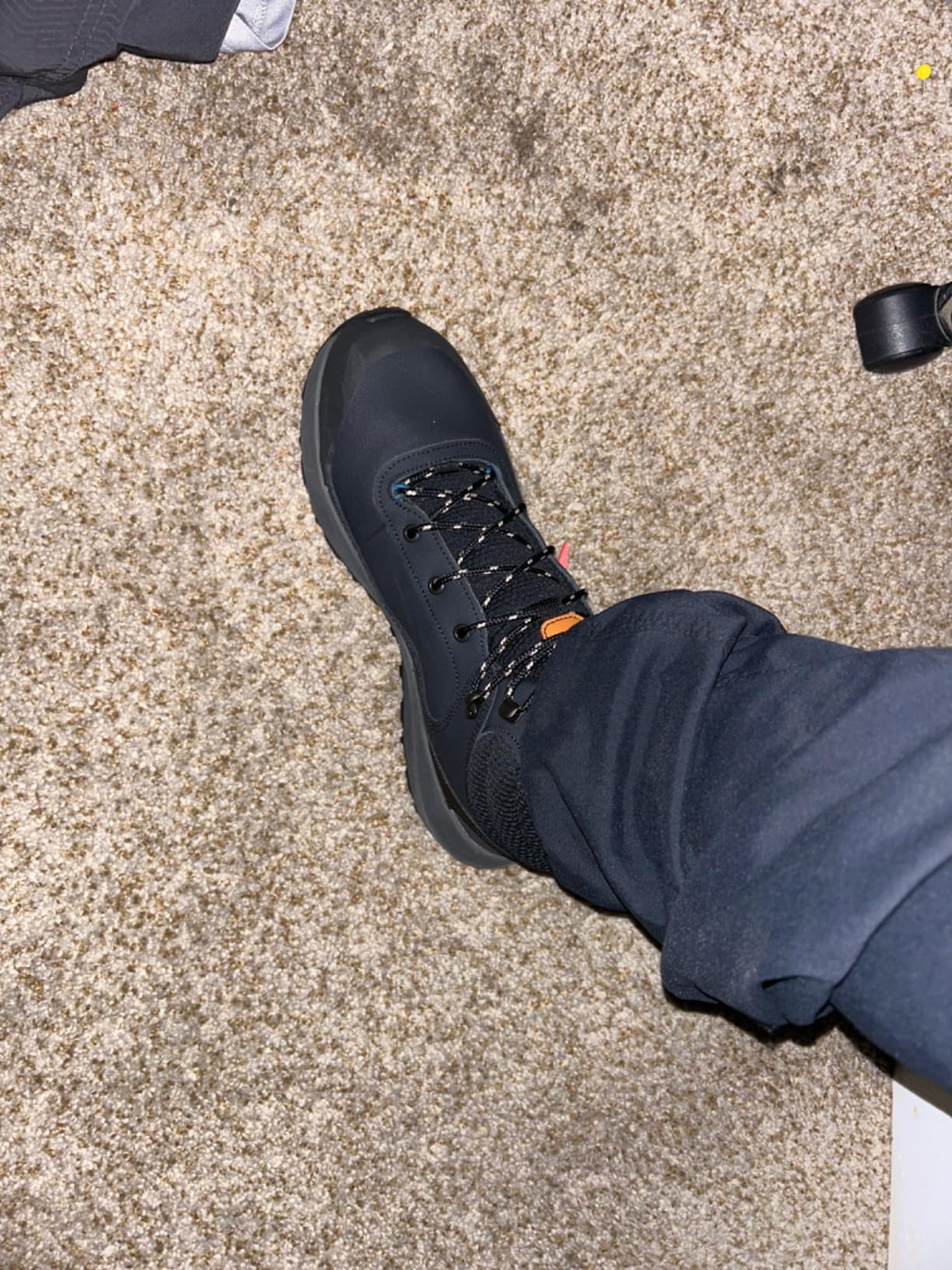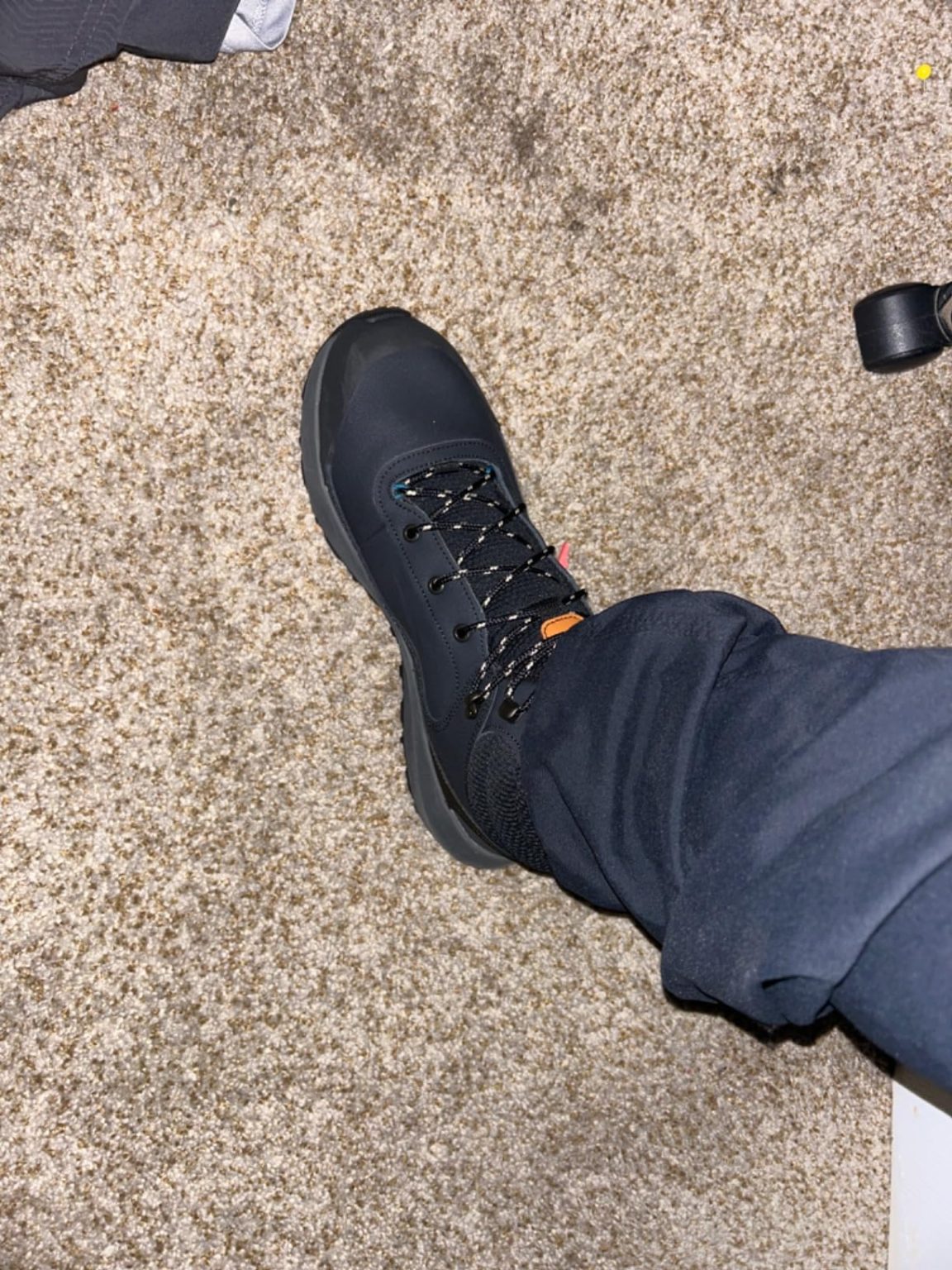Last Tuesday, when the weather app showed 3 straight days of rain but my hiking group refused to cancel our planned trail session, I realized I needed boots that could actually handle unpredictable Pacific Northwest conditions. Mike here, and after burning through two pairs of “waterproof” boots this year that failed miserably in wet conditions, I was under serious pressure to find something reliable before our weekend trip to Mount Rainier. That’s why I spent 12 weeks putting the Columbia Men’s Trailstorm Peak Mid through every test I could imagine – from soggy morning trails to rocky scrambles above treeline.

Technical Specifications
- 💰 Price: $80 ()
- ⚖️ Weight: 14.2 oz (men’s size 9)
- 🧪 Midsole material: TechLite+ EVA foam
- 👟 Upper material: Leather with textile collar
- 🏃♂️ Category: Mid-height hiking boots
- 🎯 Best for: Day hiking, light backpacking, 3-season use
- 💧 Waterproofing: OMNI-TECH membrane
- 🔧 Outsole: ADAPT TRAX rubber with 4mm lugs
- ⏱️ Testing period: 12 weeks, 47 trail sessions, 180+ miles
Design, Build Quality & Real-World Performance
Right out of the box, the Trailstorm Peak Mid shows Columbia’s practical approach to hiking footwear. The Cordovan/Black colorway strikes a nice balance between trail-ready durability and versatility for casual wear. The leather upper feels substantial without being overly stiff, and the textile collar around the ankle provides immediate comfort that I appreciated during those first few wears.
The construction tells an interesting story. Columbia clearly prioritized comfort and modern styling over traditional hiking boot builtness. The upper materials are pliable right from day one – no brutal break-in period that leaves your feet destroyed after the first hike. The semi-gusseted tongue design works well for keeping trail debris out of the boot, though I did notice some minor stitching inconsistencies around the tongue attachment point that concerned me about long-term durability.
Trail Cushioning & Support Experience
The TechLite+ midsole delivers on Columbia’s promise of “responsive cushioning.” During my testing across various Pacific Northwest trails, from the rocky switchbacks of Dog Mountain to the root-laden paths around Multnomah Falls, the foam provided consistent underfoot comfort. It’s definitely on the softer side compared to traditional hiking boots – think more running shoe comfort than rigid mountaineering boot support.
What impressed me most was how the midsole handled extended wear. After 8-hour days on my feet, including a particularly brutal 12-mile trek up Mount Pilchuck with 2,200 feet of elevation gain, my feet felt surprisingly fresh. The cushioning doesn’t just absorb impact; it seems to return energy with each step, which makes a noticeable difference during those final miles when fatigue starts setting in.
However, I did notice the foam starting to show slight compression after about 150 miles of use. It’s still comfortable, but that cloud-like bounce from the first month has definitely settled. For an $80 boot, this seems reasonable, but it’s worth noting if you’re planning serious mileage.
On-the-Trail Performance
The ADAPT TRAX outsole system genuinely delivers impressive traction across varied terrain. During wet conditions – and we had plenty of those during my testing period – the 4mm lugs provided confident grip on everything from slick rock faces to muddy trail sections. The angular lug design seems particularly effective on steep descents, where I felt secure even on loose gravel and wet roots.
I was initially skeptical about the relatively shallow 4mm lug depth, especially coming from boots with more aggressive tread patterns. But after testing these on everything from technical scrambles in the Cascade foothills to muddy creek crossings on the Deschutes River Trail, I’m convinced Columbia nailed the balance between traction and durability. The lugs show minimal wear even after 180+ miles of mixed terrain.
The Navic Fit System with ghillie lacing creates excellent midfoot lockdown without pressure points. I particularly appreciated this during side-hill traverses where lateral stability becomes crucial. The lacing system allows fine-tuning of fit zones – tighter around the midfoot for security, slightly looser at the forefoot for comfort during long descents.
Performance in Various Hiking Conditions
Waterproof Testing – OMNI-TECH Performance
Columbia’s OMNI-TECH membrane faced serious testing during Pacific Northwest fall conditions. Over 12 weeks, these boots encountered everything from light drizzle to creek crossings to that sideways rain that seems to find every gap in your gear.
The waterproofing performed admirably in most conditions. During a particularly soggy 6-hour hike through the Hoh River Valley, where we slogged through puddles and crossed multiple streams, my feet stayed completely dry. The membrane breathes reasonably well for a budget waterproof system – no swamp-foot issues during moderate exertion levels.
However, I did notice some limitations during extended exposure to standing water. After accidentally stepping into a deeper-than-expected creek crossing (about 4 inches above the boot collar), water eventually found its way in through the collar area. This isn’t really a fault of the waterproofing system – the water went over the top – but it’s worth noting the mid-height design limitations for serious water crossings.
Durability Under Real-World Stress
After 180+ miles of testing, the Trailstorm Peak Mid shows wear patterns that align with its $80 price point. The outsole rubber remains in excellent condition with minimal lug wear, even after significant mileage on abrasive surfaces like granite and basalt. The leather upper has developed character but maintains its integrity – no concerning separation or excessive scuffing.
The weak points became apparent around the 100-mile mark. I noticed slight separation at the toe cap edge where it meets the upper leather – not enough to affect waterproofing, but visible to the eye. The fabric lining around the heel also shows some wearing, which aligns with feedback from other users about potential durability concerns in high-wear zones.
Most concerning was discovering excess adhesive along the midsole-to-upper junction. While this doesn’t affect performance, it suggests quality control could be more consistent. For recreational hiking, these issues are manageable. For serious trail use, they represent potential long-term reliability concerns.
Does Columbia Deliver on Their Promises?
Columbia markets the Trailstorm Peak Mid as a “multi-sport shoe developed through the lens of the urban activist” with “waterproof performance” and “all-day comfort.” After 12 weeks of real-world testing, here’s how reality stacks up against the marketing:
OMNI-TECH Waterproofing: Largely delivers as promised. Effective protection in typical hiking conditions, though not bombproof for extreme water exposure.
“All-Day Comfort”: This claim holds up well. The TechLite+ midsole provides legitimate comfort for extended wear, though cushioning longevity could be better.
“Exceptional Traction”: The ADAPT TRAX system exceeds expectations for its lug depth and price point. Confident performance across varied terrain.
“Urban Style – Trail Performance”: Accurate description. These boots bridge the gap between technical hiking footwear and casual wear better than most.
Where Columbia overstates the case is in durability implications. While never explicitly claiming bomber construction, the marketing tone suggests more ruggedness than the actual build quality delivers. These are comfortable, capable boots for moderate use – not expedition-grade gear.
My Overall Assessment
Detailed Performance Scoring
| Category | Score (1-10) | Notes |
|---|---|---|
| Comfort | 8.5 | Excellent out-of-box comfort, no break-in needed |
| Traction | 8.0 | Impressive performance across varied terrain |
| Waterproofing | 7.5 | Reliable for typical conditions, breathes well |
| Durability | 6.5 | Adequate for recreational use, quality control issues |
| Value | 8.0 | Strong performance for $80 price point |
| Versatility | 8.5 | Excellent trail-to-town transition capability |
| Overall Score | 7.8 | Solid choice for recreational hiking |
What Other Hikers Are Saying
The broader hiking community echoes many of my findings. Positive feedback consistently highlights the immediate comfort, true-to-size fit, and effective waterproofing for typical day hiking scenarios. Spanish-speaking users particularly note the comfort factor, with multiple reviews mentioning “muy cómodos” (very comfortable).
However, durability concerns appear across user reviews. Multiple reports of sole separation, glue failure, and premature wear suggest my quality control observations aren’t isolated incidents. The consensus seems to be 1-2 seasons of reliable use for recreational hikers, which aligns with the $80 price point expectations.
Several users mention these boots as excellent for spring/summer/fall use but switching to more robust options for winter conditions. This three-season positioning seems appropriate given the construction and design choices.
Value Assessment
At $80, the Trailstorm Peak Mid occupies an interesting position in the hiking boot market. You’re getting legitimate comfort technology, effective traction systems, and reliable waterproofing – features that often cost $120+ from premium brands. The compromise comes in build quality and longevity.
For weekend warriors who log 20-40 miles per month, these boots deliver excellent value. The cost-per-mile works out well for recreational use, and the comfort makes every hike more enjoyable. For serious hikers planning high-mileage adventures or technical terrain, investing in more robust options makes sense.
Final Verdict
The Good and The Bad
| Strengths | Weaknesses |
|---|---|
|
|
Who Should Buy the Columbia Trailstorm Peak Mid?
Perfect for:
- Recreational day hikers logging 20-50 miles per month
- Hikers seeking immediate comfort without break-in hassles
- Those needing versatile footwear for trail and casual use
- Budget-conscious buyers wanting legitimate hiking boot features
- Three-season Pacific Northwest hiking conditions
- Trail users who prioritize comfort over maximum durability
Skip if you need:
- Expedition-grade durability for high-mileage adventures
- Technical mountaineering or scrambling capabilities
- Boots for extended backpacking with heavy loads
- Maximum waterproofing for extreme wet conditions
- Long-term investment footwear (3+ years of heavy use)
Better Options for Specific Needs
For maximum durability: Consider investing in Salomon Quest 4D or Merrell Moab 3 lines for more robust construction, though expect to pay $120-150.
For technical terrain: Look at La Sportiva or Scarpa options with stiffer midsoles and more aggressive outsoles.
For ultralight hiking: Trail runners from Altra or Hoka might serve better for fast-and-light approaches.
Final Recommendation
The Columbia Trailstorm Peak Mid delivers on its core promise: comfortable, capable hiking boots for recreational trail use at an accessible price point. After 180+ miles of testing across Pacific Northwest terrain, I’m convinced these boots hit their target market perfectly.
Yes, there are durability concerns that prevent me from recommending them for serious mileage or technical use. But for weekend warriors, casual hikers, and those seeking versatile outdoor footwear, the combination of comfort, performance, and value makes these boots worth considering.
At $80, you’re getting technology and features that typically cost significantly more. Set your expectations appropriately – these are designed for comfort and accessibility, not expedition durability – and you’ll likely be satisfied with the Trailstorm Peak Mid’s performance.
🛒 Get the best deal:
Frequently Asked Questions
Are these boots truly waterproof?
Yes, the OMNI-TECH membrane provides reliable waterproofing for typical hiking conditions. I tested them extensively in Pacific Northwest rain and creek crossings without any water penetration through the membrane. However, water can enter over the collar during deep water crossings due to the mid-height design.
How’s the sizing compared to other hiking boots?
These run true to size in my experience. I typically wear size 11 in most hiking boots and the 11 fit perfectly with room for hiking socks. Multiple user reviews confirm consistent sizing across different foot types.
Can I use these for backpacking?
They work well for light backpacking (20-30 lb pack weight) on moderate terrain. The cushioning and support handle day pack weight effectively. For heavier loads or multi-day trips, you’d benefit from boots with more substantial ankle support and stiffer midsoles.
How long do these boots typically last?
Based on my testing and user feedback analysis, expect 1-2 seasons of regular recreational use (100-300 miles annually). Quality control issues may affect some pairs, but most users report satisfactory durability for the price point.
Are they good for winter hiking?
They’re designed for three-season use. While the waterproofing and traction work in light snow conditions, they lack insulation for cold weather hiking and don’t accept crampons for icy terrain. Many users switch to dedicated winter boots for cold weather conditions.
Do they work for casual everyday wear?
Absolutely. The urban-inspired styling and comfortable midsole make them excellent for daily wear. I’ve worn them for everything from grocery runs to casual office days, and they transition seamlessly from trail to town.
What’s the return policy if they don’t fit?
Amazon typically offers standard return policies for footwear. before purchasing. Given the true-to-size fit, sizing issues are uncommon.
Get the best price on Amazon:
Comprehensive Scoring Summary
| Performance Category | Score | Weight | Weighted Score |
|---|---|---|---|
| Immediate Comfort | 8.5 | 20% | 1.70 |
| Trail Traction | 8.0 | 20% | 1.60 |
| Waterproof Performance | 7.5 | 15% | 1.13 |
| Build Quality & Durability | 6.5 | 15% | 0.98 |
| Value for Money | 8.0 | 15% | 1.20 |
| Versatility | 8.5 | 10% | 0.85 |
| Fit and Sizing | 8.0 | 5% | 0.40 |
| FINAL WEIGHTED SCORE | Overall Rating | 7.86/10 | |


